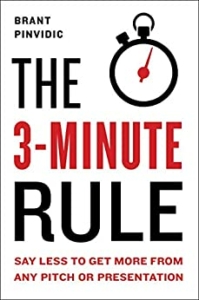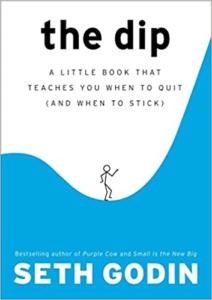Blogs That Go WHAC
Write less,” advises Seth Godin in the preface to his book The Dip. Now Brant Pindvidic, in his book The 3-Minute Rule, tells us to “say less to get more from any pitch or presentation”.
At Say It For You, I teach the principle of “reading around”, emphasizing the point that business bloggers are going to need to spend at least as much time reading as writing. Even after almost a decade and a half creating blog content for business owners and practitioners, I feel the need to keep up on what others are saying on the topic, what’s in the news, and what problems and questions have been surfacing that relate to what my clients offer. But now, both these business authors are making the case for less, not more, when it comes to sales pitches, speeches, and blog posts.
It seems this “reading around” habit of mine has presented me with a dilemma: Godin’s and Pinvidic’s advice to write and say less seems to fly in the face of the latest trend towards long-form blog posts with a word count numbering in the thousands.
Brant Pinvidic’s advice is based on the science of approach motivation. “Every time you make a pitch, presentation, or proposal to try to influence anyone to do anything, your audience’s first impression will be fully formed in less than three minutes”. And it’s not that we’re all dumbed-down, he says, but that people today focus more intensely and efficiently, he explains. The WHAC outline helps organize the key information you need to impart – and dictates the order in which you present that information:
W – What is it? (What is your offer?)
H – How does it work?) work? (Why are the elements of your offer and why are they valuable or
Important?)
A– Are you sure? (This is a fact or figure that backs up your information and establishes
potential.)
C – Can you do it? (Your ability to execute and deliver.
In the first two stages, the W and the H, the audience will conceptualize. In the A stage, they will contextualize, judging whether your offer is true real, and right. In the C stage, the audience will be asking whether this could actually happen in the way being described.
Transferring this model to the arena of blog marketing, I’d suggest that the WHAC sequence could be employed over a series of blog posts rather than using it all in one. One concept I emphasize in corporate blogging training sessions is that blog posts can stay smaller and lighter in scale than the more permanent content on the corporate website or the content in white papers. What helps the separate posts fit together into an ongoing business blog marketing strategy are the blog “leitmotifs” or themes.
Whether Godin’s “Write less” advice is suited for us blog content writers remains a matter of debate. On the other hand, “Read more” continues to be a requirement for imparting bog posts with WHAC!






Follow us online!